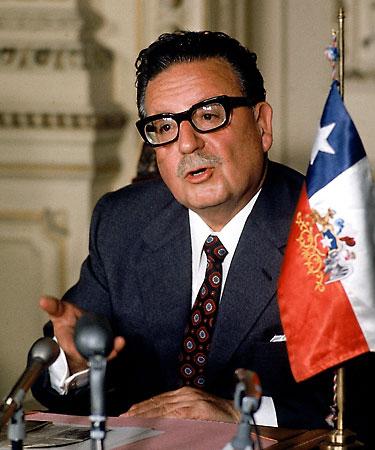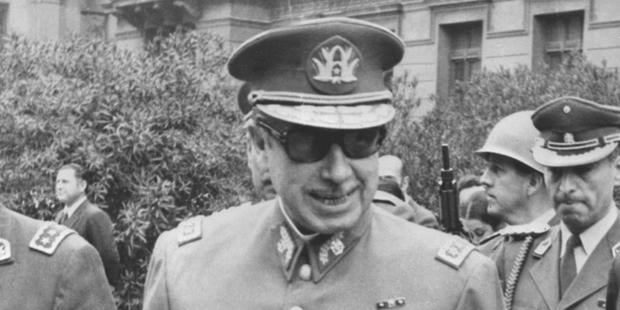Salvador Allende: The Death of a President Who Lives On
Forty-five years have passed since the September 11 when Chilean President Salvador Allende died in a military coup led by General Augusto Pinochet

“A great black cloud rises from the flaming palace. President Allende dies at his post. The military kills thousands throughout Chile. (…) Señora Pinochet declares that the tears of mothers will redeem the country. Power, all power, is assumed by a military junta of four members, formed in the School of the Americas in Panama. Heading it is General Augusto Pinochet.”
Eduardo Galeano’s words outline what happened on September 11, 1973, one of the most deeply engraved dates in the history of Chile, and of Our America. That day, after several hours of siege and bombing of Santiago de Chile’s La Moneda Presidential Palace, Chilean President Salvador Allende died under the fire of the coup plotters.
How did Allende die? The Military Junta declared the following day, September 12, 1973, that he had taken his own life.
Like a “glorious dead figure… riddled and ripped to pieces by the machine guns of Chile’s soldiers, who had betrayed Chile once more,” wrote Pablo Neruda from his deathbed on September 14.
“Under the enemy bullets, as a soldier of the Revolution,” his widow Hortensia Bussi said four days later in Mexico.
Whether the President died at the hands of the army personnel conducting the coup led by Pinochet, or took his own life before surrendering that September 11, 1973, the bullets that killed him – wherever they came from – perpetrated one of the most despicable magnicides in Latin American history.
Allende was buried secretly; only his widow was allowed to accompany his corpse. It is said that this brave, dignified man, resisted for six hours with a rifle the leader of the Cuban Revolution, Fidel Castro, had given him – the first gun Salvador Allende ever fired.
Forty-five years have passed since Allende’s death. That night, the coup forces delivered a brief report to General Augusto Pinochet:
“Mission accomplished. Moneda taken, President dead.”
The Popular Unity coalition and its President had been annihilated, marking the beginning of 17 years of military dictatorship.
As leader of the Chilean left, Salvador Allende won the presidential elections of 1970 and implemented a policy of nationalizations of the mining and industrial sectors. In the midst of an economic crisis in 1973, his support was confirmed in parliamentary elections, which led to the violent intervention of the army in the country’s political life.
During his first year in office, 47 industrial companies and more than half of the banking system were nationalized. With the agrarian reform, some 2,400,000 hectares of productive land were expropriated and became social property.
Salvador Allende was the first Marxist politician in the West to come to power through general elections in a democratic state.
“The most dramatic contradiction of his life was being at the same time the congenital foe of violence and a passionate revolutionary. He believed that he had resolved the contradiction with the hypothesis that conditions in Chile would permit a peaceful evolution toward socialism under bourgeois legality,” Gabriel García Márquez recalled in the article “Why Allende had to die.”
These were, in brief, his true crimes, those which imperialism and the most reactionary, extreme right of Chile and the region could not forgive the charismatic leader for, supported by the majority of the people.
The Most Conventional of Wars
A coup d’état, assassinations, a blow to democracy, a threat to sovereignty, a proxy government, a puppet, a suffering people… all this happened in Chile more than four decades ago. Yet today, we are faced with similar threats.
The reality is clear: progressive countries of the continent are victims of destabilizing attempts that seek to generate chaos in the streets, to the point of provoking the final blow.
Soft coups and unconventional warfare represent the Condor Plan of today in Latin America. This time, our enemies are not persecuting a Chile full of copper, but attacking consciences, wills, manipulating reality with falsehood and lies.
In the documents that govern the political life of the United States, unconventional warfare (abbreviated UW) is defined as “Activities conducted to enable a resistance movement or insurgency to coerce, disrupt, or overthrow a government or occupying power by operating through or with an underground, auxiliary, and guerrilla force in a denied area,” as explained by the Doctor of Legal Sciences and National Security researcher Hugo Morales Karell.
“In the last decade, UW has emerged as the most feasible means used by the United States and its allies to overthrow governments contrary to their interests,” Morales continued. There have been many variants: pretexts to generate anti-government demonstrations and popular discontent due to the economic, political, and social situation of a nation, intervention in countries’ internal affairs by third countries alleging supposed humanitarian crises or human rights violations, and the promotion of a supposed internal opposition.
There are many examples, even recognized by the United States in its doctrinal documents: Albania and Latvia (1951-1955); Tibet (1955-1970); Indonesia (1957-1958); Cuba and the Bay of Pigs invasion (April 1961); Laos (1959-1962); North Vietnam (1961-1964); Nicaragua and Honduras (1980-1988); Pakistan and Afghanistan (1980-1991), and Iraq (2002-2003). To these can be added the cases of Venezuela, Brazil, Bolivia, in which the objective of halting the advance of the progressive left in the region is obvious.
These are the realities of today. While there may be no gunboats, drones, bombs or militarily interventions, the attacks continue. Today, well-rehearsed manipulation of young people, making use of the benefits provided by information and communications technologies and intense media campaigns to exert political pressure results, as Professor Karell stressed, in “the most conventional of wars.”
But we shouldn’t be in any doubt: imperialist forces will return again and again to the use of brutal force and the cruel assassination of leaders like Allende whenever it is in their interests and they are lacking the means to defeat the peoples and governments that are an “inconvenience” and attempt to challenge their hegemony.
*
Note to readers: please click the share buttons above. Forward this article to your email lists. Crosspost on your blog site, internet forums. etc.


